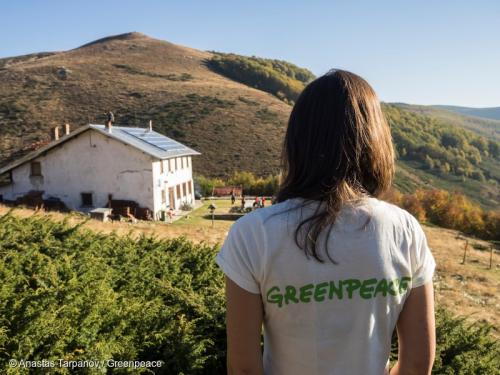EU overturns barriers to rooftop revolution but renewable target falls short of serious climate action
Solar panels could soon cover millions more rooftops in Europe, after the EU reached a deal on Wednesday to make it easier for households to play a part in the renewable energy transition, said Greenpeace.
At the same time, European governments curbed the Parliament’s efforts to increase the share of renewables in the EU’s energy system, with a review of the target in 2023, and rejected important safeguards against the harmful effects of bioenergy and biofuels.

Renewable installation at “Tuzha” Mountain Hut in Bulgaria
Greenpeace EU energy policy adviser Sebastian Mang said: “This deal, for the first time, recognises the rights of ordinary people to participate in Europe’s energy revolution and overturns some very big barriers to the fight against climate change. It gives people and communities greater control over their energy use, empowering them to accelerate the development of renewable energy and challenge energy giants across the continent. But the renewables target of 32 percent is far too low and allows power companies to cling onto fossil fuels and false solutions.”
The deal between the European Parliament and European governments establishes the right of European citizens, local authorities, small businesses and cooperatives to produce, consume, store and sell their own renewable energy, without being subject to punitive taxes or excessive red tape. It bans punitive measures that some countries introduced to prevent their citizens from participating in the energy transition, such as the requirement that individuals in Romania set up a company and meet fiscal requirements before they can sell any energy they produce to the grid. Another example is the Spanish ‘sun tax’, which hampers small-scale renewable energy production with steep fees and administrative hurdles. Ending punitive measures was one of the European Parliament’s core demands throughout negotiations with European governments.
For the first time, EU law will acknowledge the role democratically controlled cooperatives play in the energy transition, making it easier for people to set up their own renewable energy projects and putting safeguards in place to protect them from the market dominance of major power companies. According to a recent study, cooperative-owned projects bring eight times more revenue into the local economy than a project by a major power company.
Greenpeace also warned that the minimum renewable-energy target of 32 percent in 2030 falls dangerously short of the level necessary to prevent catastrophic climate change. The deal will also allow countries and companies to continue labelling harmful bioenergy as renewable energy, paving the way for more trees to be cut down and rainforests cleared for biofuel crops to fuel power plants, factories and cars. Negotiators agreed to freeze the use of of biofuels that significantly harm biodiversity, such as palm oil, at current levels, gradually phase them out by 2030 and end the current obligation for EU countries to include crop-based biofuels in their transport mix.
Source: Greenpeace European Unit
- 288 reads
Human Rights
Fostering a More Humane World: The 28th Eurasian Economic Summi

Conscience, Hope, and Action: Keys to Global Peace and Sustainability

Ringing FOWPAL’s Peace Bell for the World:Nobel Peace Prize Laureates’ Visions and Actions

Protecting the World’s Cultural Diversity for a Sustainable Future

Puppet Show I International Friendship Day 2020

